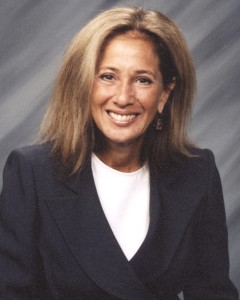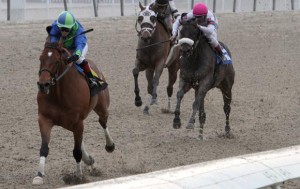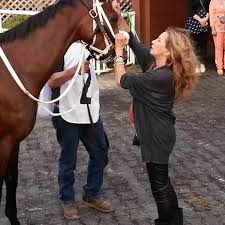Written by Barbara Newtown
Original Publish Date January 2015
 Maggi Moss runs Thoroughbreds at tracks across the country. She’s only been in the racing business for sixteen years (and racing in Louisiana for the past ten years), but she has made her mark nationwide with her success and her beliefs.
Maggi Moss runs Thoroughbreds at tracks across the country. She’s only been in the racing business for sixteen years (and racing in Louisiana for the past ten years), but she has made her mark nationwide with her success and her beliefs.
“I have no issue with using Thoroughbreds in racing,” she says. “Of course I think that all horses should have an opportunity to get turned out and stroll around and eat grass.” But keeping a racehorse in a stall is not necessarily cruel. Thoroughbreds in a good barn are treated better than most people. They have good feed, they have clean straw, and they get exercise. A horse standing in a pasture can be bothered by flies, be malnourished, but above all he is probably bored. Maggi believes that people and horses need a purpose and a routine. “People are creatures of habit: we get up, we take a shower, we eat, we go to work,” she says. Horses need purpose, too, to be happy.
“Visit my barns,” she says. “My horses hang their heads out of the stalls, nicker at people, eat peppermints. I sleep very well at night.” Maggi’s top priority when choosing a trainer is how he takes care of the horses.
“It isn’t rocket science. I believe that if you are good to your horses, you will be rewarded.” Maggi has no tolerance for abusers. Horses have no choice about where they are born or where they end up. She believes that we have an absolute responsibility to give them a good life. Thoroughbreds, in particular, will try to please, even in the wrong hands. They have such heart—such toughness and courage—that they will perform, even if they are hurting.
How does Maggi combine compassion with a successful business plan? She picks up claimers that have already been bred, raised, shipped, trained, and raced. She doesn’t spend money getting a horse ready to race. Any business is a game of overhead, she says…unless you are independently wealthy and don’t care where the dollars go. Breeding or buying yearlings means that you have to wait two or three years until the horse is ready to compete, and the horse may still not earn any money at the track. Maggi does breed and does buy young prospects, but limits what she takes on. “That business plan can go the wrong way very quickly!”
Before Maggi became a racehorse owner, she was a trial lawyer. Women trial lawyers were rare, and Maggi knew that she had to outwork the men. She kept down the overhead at her law office. “It’s easy to spend five times what you really have to when you’re running a law office.” Just like the racing business. “I was raised to respect the dollar. I’m not about to throw money away.”
Maggi also outworked the men in research and preparation. “There’s always something to learn or something to follow that will help you.” She has carried the same 24/7 dedication to acquiring knowledge to racing. “There is a wealth of material out there.” The information follows patterns that the smart researcher can discover.
“Hundreds of things can be deciphered from the Daily Racing Form [http://drf.com],” she says. Maggi pays attention to trends on different race tracks, what trainers are doing with their horses, and how other owners run their businesses. The Beyer numbers, an essential tool in the Racing Form, “are a numerical representation of a horse’s performance, based on the final time and the inherent speed over the track on which the race was run” (Dean Keppler). High Beyer numbers are desirable: Andrew Beyer says the top Beyer number ever was earned by the sprinter Groovy in 1987: 132. Beyer hadn’t developed his system yet when Secretariat won the Belmont, but he estimates the red horse’s Beyer number would have been 139. A $2,500 claimer might score a 57 in the Beyer system.
Equibase (www.equibase.com) is another valuable tool. The Speed Figures analyze performance by taking into account not only the difference between tracks (dimensions, surface, etc.), but the changes that occur from race to race on the same track. The Class Ratings, according to Equibase, are a “relative rating for a given field of horses in a given race at a given track.” Combining the two numbers can give a researcher (a bettor or someone looking to buy or breed) a prediction about where a horse will finish in a race against specific opponents.
Len Ragozin developed “The Sheets,” one for each horse running in a race. Each sheet shows a horse’s entire racing career as well as time laid off. The horse earns a Ragozin number based on how much “quality” the horse showed on a given day. Ragozin says, “The rating includes speed, weight, allowance for unusual track conditions, racing wide or saving ground, headwinds or tailwinds, peculiarities of track construction such as downhill areas, etc.” Lower numbers are better, and one point generally means one or two lengths. The best horses score in the single digits and the worst score in the 40s.
Maggi stays up into the wee hours analyzing the numbers and adding in her personal knowledge of how trainers do their jobs. She looks for claimers that will blossom in the right conditions—that is, in her stables. In sixteen years she has become a nationwide success in the Thoroughbred industry.
“I was in politics for a long time,” says Maggi, “but there’s nothing political about me. I am at a point where telling the truth and speaking from the heart just works. I have nothing to gain, I am not out to impress anybody, and I’m not impressed with myself. I just care deeply about horses. The welfare of horses is my main deal. In fact, I prefer horses to people!” Horses do not lie. “If you pay attention, that is correct,” she says.
Maggi, in philosophical terms, speaks Truth to Power. She says that racing has changed. The claiming game doesn’t work as well in today’s world. “We are breeding a lot more unsound horses and we are running them into the ground. It’s hard to find healthy, sound horses.”
The casinos, she believes, are killing racing. When the casino money came in, the racing world rejoiced. But that casino money is not going to purses; the casinos don’t want to give it back. “The casinos are creating an inferior, cheap product,” she says. Desperate trainers will keep bumping horses down to worse tracks and worse races and running those horses into the ground, hoping for a hundred or two in earnings.
What is disappearing is the middle ground of good, sound horses. Much as the middle class is disappearing from America and the poor and the wealthy classes are increasing in numbers, the same is happening to Thoroughbred racing. Breeding and buying yearlings is gaining as a business plan. Millions and millions are being spent on the high end of the sport. “Racing to turning back into the sport of kings,” she says.
What does that mean for horses on the low end? In the past, Maggi would “re-purpose” the claimers she bought that proved not to be earners. She knows many failures at the track who now live happy lives doing hunters, three-day eventing, or just pleasure riding. But the situation now is so brutal that finding a sound, reasonably-priced claimer with potential for “an afterlife” is difficult.
Maggi believes that we are sending a lot of substandard horses to the track, which results in thousands of horses being sent off to slaughterhouses. “An atrocity,” says Maggi. If people could see the actual slaughter process, the crowding, the shipping of mares and babies, the terror on the horse’s faces, they would demand that an owner forego the $250 he or she might have gotten at the slaughter auction and spend $250 to have the horse euthanized properly.
“I talk to the big owners about this problem, and they just look at the ground.” The slaughterhouse atrocities happen every day, and everyone tries to hide it. Maggi describes the downward spiral of an underperforming horse: perhaps born in a fancy barn to a big-time breeder, the horse fails to fulfill its promise; he’s put in a claiming race, and ends up at a minor track; he proves too expensive to keep; he gets sold at a slaughter auction and suffers a terrible end.
Maggi follows her horses. She doesn’t want them to experience that sad fate. “You put something on their papers that lets people know that you want to know what they’re doing and where they are.” If Maggi loses a horse at the claim box, she registers the horse with the Daily Racing Form’s Stable Mail, a free service that sends you an email notice if a horse, trainer, or jockey has any race-related activity. (Equibase’s Virtual Stable is another free notification service.)
“For instance,” she says, “if I kept track of one of my horses that showed up in not the best person’s hands, and he went to a track that scared me a lot, I would just claim the horse back and retire him. I’ve had my horses show up in bad places. It’s my job, because they were my horses, to do what I can to save them.”
Horse rescue takes up as much of Maggi’s time as her racing business. “There’s an unofficial network of people who keep their eyes out for horses that need to be rescued. There are people sending money to PayPal to underwrite rescue work.” Maggi knows many horse rescue people, and they know her. She can afford to rescue horses she herself has owned and perhaps a few more, but she can’t respond to all the requests she gets.
“I look at it this way,” says Maggi. “I have been incredibly blessed. I’ve earned everything that I’ve done. I am self-made, and I’ve worked really hard. I have been blessed in a business that I really don’t fit in. I don’t fit because I’m not married to money and nobody dropped a million dollars on me as an inheritance. I give back and give back and give back by saving horses from people who have a lot more money than I do. That’s how I sleep at night.”
“The greatness of a nation and its moral progress can be judged by the way its animals are treated.” –Mahatma Gandhi





